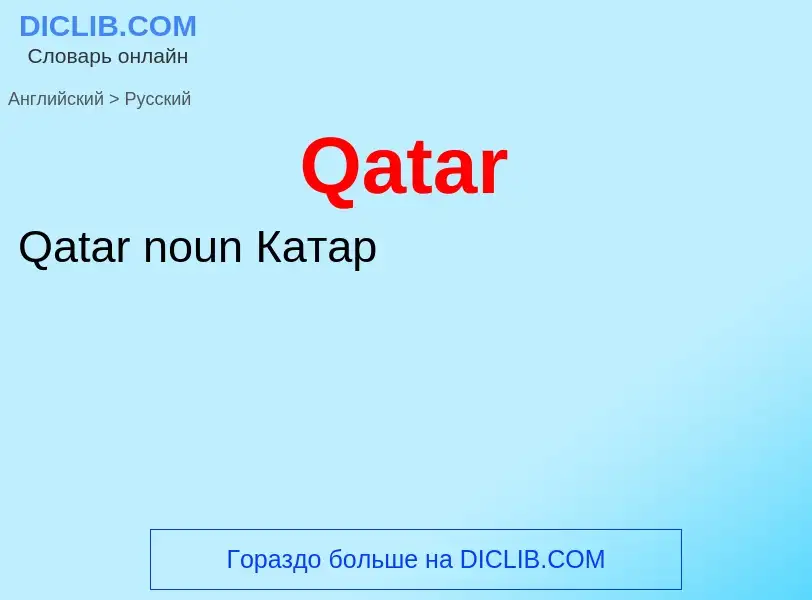Traducción y análisis de palabras por inteligencia artificial
En esta página puede obtener un análisis detallado de una palabra o frase, producido utilizando la mejor tecnología de inteligencia artificial hasta la fecha:
- cómo se usa la palabra
- frecuencia de uso
- se utiliza con más frecuencia en el habla oral o escrita
- opciones de traducción
- ejemplos de uso (varias frases con traducción)
- etimología
Qatar - traducción al Inglés
[ke'tɑ:'kɑ:tɑ:]
существительное
география
Катар
Definición
Воспаление слизистой оболочки какого-л. органа; катаральное воспаление.
Wikipedia
Qatar (UK: , US: ; Arabic: قطر, romanized: Qaṭar [ˈqɑtˤɑr]; local vernacular pronunciation: [ˈɡɪtˤɑr]), officially the State of Qatar, is a country in Western Asia. It occupies the Qatar Peninsula on the northeastern coast of the Arabian Peninsula in the Middle East; it shares its sole land border with Saudi Arabia to the south, with the rest of its territory surrounded by the Persian Gulf. The Gulf of Bahrain, an inlet of the Persian Gulf, separates Qatar from nearby Bahrain. The capital is Doha, home to over 80% of the country's inhabitants, and the land area is mostly made up of flat, low-lying desert.
Qatar has been ruled as a hereditary monarchy by the House of Thani since Mohammed bin Thani signed a treaty with the British in 1868 that recognised its separate status. Following Ottoman rule, Qatar became a British protectorate in 1916, and gained independence in 1971. The current emir is Tamim bin Hamad Al Thani, who holds nearly all executive and legislative authority under the Constitution of Qatar, as well as controlling the judiciary. He appoints the prime minister and cabinet. The partially-elected Consultative Assembly can block legislation and has a limited ability to dismiss ministers.
In early 2017, the total population of Qatar was 2.6 million, with 313,000 of them Qatari citizens and 2.3 million expatriates. Its official religion is Islam. In terms of income, the country has the fourth-highest GDP (PPP) per capita in the world, and the eleventh-highest GNI per capita (Atlas method). Qatar ranks 42nd in the Human Development Index, the third-highest HDI in the Arab world. It is a high-income economy, backed by the world's third-largest natural gas reserves and oil reserves. Qatar is one of the world's largest exporters of liquefied natural gas, and the world's largest emitter of carbon dioxide per capita.
In the 21st century, Qatar emerged as a middle power in the Arab world through its resource-wealth, as well as its globally expanding media group, Al Jazeera Media Network, and reportedly supporting several rebel groups financially during the Arab Spring. Qatar forms part of the Gulf Cooperation Council. Qatar's human rights record has been regarded by academics and non-governmental organisations as being generally poor, with restrictions on civil liberties such as the freedoms of association, expression and the press, as well as its treatment of thousands of migrant workers amounting to forced labour for projects in the country.

![[[Abbasid Caliphate]] at its greatest extent, c. 850 [[Abbasid Caliphate]] at its greatest extent, c. 850](https://commons.wikimedia.org/wiki/Special:FilePath/Abbasids850.png?width=200)
![The news desk of [[Al Jazeera English]], a Qatari news channel The news desk of [[Al Jazeera English]], a Qatari news channel](https://commons.wikimedia.org/wiki/Special:FilePath/Al Jazeera English Newsdesk.jpg?width=200)

![Fireworks in opening ceremony [[Asian Games 2006]] Fireworks in opening ceremony [[Asian Games 2006]]](https://commons.wikimedia.org/wiki/Special:FilePath/Asian Games Doha 2006 fireworks.jpg?width=200)
![Sheikh Mohammed bin Jassim Al Thani]] Sheikh Mohammed bin Jassim Al Thani]]](https://commons.wikimedia.org/wiki/Special:FilePath/Barzan towers 3.jpg?width=200)
![A British [[Wilding series]] stamp, issued 1 April 1957, and overprinted for use in Qatar. A British [[Wilding series]] stamp, issued 1 April 1957, and overprinted for use in Qatar.](https://commons.wikimedia.org/wiki/Special:FilePath/British stamp overprinted for use in Qatar 1 April 1957.jpg?width=200)
![Traditional [[dhow]]s in front of the West Bay skyline as seen from the [[Doha Corniche]]. Traditional [[dhow]]s in front of the West Bay skyline as seen from the [[Doha Corniche]].](https://commons.wikimedia.org/wiki/Special:FilePath/Corniche Doha Qatar.jpg?width=200)
![Student Center in [[Education City]]. Education City houses various educational facilities, including satellite campuses of eight international universities. Student Center in [[Education City]]. Education City houses various educational facilities, including satellite campuses of eight international universities.](https://commons.wikimedia.org/wiki/Special:FilePath/Entrance to Student Center in Education City.jpg?width=200)
![Kassite]] dye site on [[Al Khor Island]] Kassite]] dye site on [[Al Khor Island]]](https://commons.wikimedia.org/wiki/Special:FilePath/Excavated site on Al Khor Island.jpg?width=200)
![[[Hamad International Airport]] [[Hamad International Airport]]](https://commons.wikimedia.org/wiki/Special:FilePath/Hamad International Airport Doha Qatar 6.jpg?width=200)
![Ad Dawhah]] (Doha), the most populous municipality in Qatar. Ad Dawhah]] (Doha), the most populous municipality in Qatar.](https://commons.wikimedia.org/wiki/Special:FilePath/IMG copy.jpg?width=200)
![Museum of Islamic Art]] in Doha Museum of Islamic Art]] in Doha](https://commons.wikimedia.org/wiki/Special:FilePath/IslamicArtMuseumDohaSkyline.jpg?width=200)
![[[Doha Metro]] [[Doha Metro]]](https://commons.wikimedia.org/wiki/Special:FilePath/J27 443 Siemens Avenio für Doha.jpg?width=200)
![Samuel Dunn]] depicting ''Catura'' (at centre) in the [[Historical region of Bahrain]]. Samuel Dunn]] depicting ''Catura'' (at centre) in the [[Historical region of Bahrain]].](https://commons.wikimedia.org/wiki/Special:FilePath/Map of Catura (Qatar) 1794 (cropped).jpg?width=200)
![[[Mesaieed Industrial Area]] [[Mesaieed Industrial Area]]](https://commons.wikimedia.org/wiki/Special:FilePath/Mesaieed Industrial Area panoramic view at night.png?width=200)

![[[Msheireb Downtown Doha]] The World's first sustainable Downtown regeneration project [[Msheireb Downtown Doha]] The World's first sustainable Downtown regeneration project](https://commons.wikimedia.org/wiki/Special:FilePath/Msheireb Doha.jpg?width=200)
![[[National Museum of Qatar]] in Doha [[National Museum of Qatar]] in Doha](https://commons.wikimedia.org/wiki/Special:FilePath/Old Palace at National Museum of Qatar.jpg?width=200)

![Emir [[Tamim bin Hamad Al Thani]] with U.S. President [[Joe Biden]] in January 2022. Emir [[Tamim bin Hamad Al Thani]] with U.S. President [[Joe Biden]] in January 2022.](https://commons.wikimedia.org/wiki/Special:FilePath/P20220131AS-2199 (51914956197).jpg?width=200)
![the Pearl]] the Pearl]]](https://commons.wikimedia.org/wiki/Special:FilePath/Pearl-Qatar Doha Qatar 11Nov2017 SkySat.jpg?width=200)
![[[Qatar Airways]] [[Airbus A380]], Qatar Airways, one of the world's largest airlines, links over 150 international destinations from its base in [[Doha]]. [[Qatar Airways]] [[Airbus A380]], Qatar Airways, one of the world's largest airlines, links over 150 international destinations from its base in [[Doha]].](https://commons.wikimedia.org/wiki/Special:FilePath/QTR A7-APA A380!137 EDHI 16-04-14.jpg?width=200)
![[[Qatar Central Bank]]'s office in [[Doha]]. [[Qatar Central Bank]]'s office in [[Doha]].](https://commons.wikimedia.org/wiki/Special:FilePath/QatarCentralBankOffice.jpg?width=200)
![[[Qatar University]] [[Qatar University]]](https://commons.wikimedia.org/wiki/Special:FilePath/QatarUniversityEastView.jpg?width=200)
![[[Lusail Stadium]] [[Lusail Stadium]]](https://commons.wikimedia.org/wiki/Special:FilePath/Rendering of Lusail Stadium upon completion.jpg?width=200)
![Mirage 2000s]] fly in formation during Air Defense Exercise. Mirage 2000s]] fly in formation during Air Defense Exercise.](https://commons.wikimedia.org/wiki/Special:FilePath/Two Qatari mirages 2001 flying in 2019.jpg?width=200)
![[[Amiri Diwan of the State of Qatar]], administrative office of the Emir. [[Amiri Diwan of the State of Qatar]], administrative office of the Emir.](https://commons.wikimedia.org/wiki/Special:FilePath/View of Amiri Diwan from the corniche.jpg?width=200)
![[[Zubarah Fort]] built in 1938. [[Zubarah Fort]] built in 1938.](https://commons.wikimedia.org/wiki/Special:FilePath/Zubarah Fort1.jpg?width=200)
